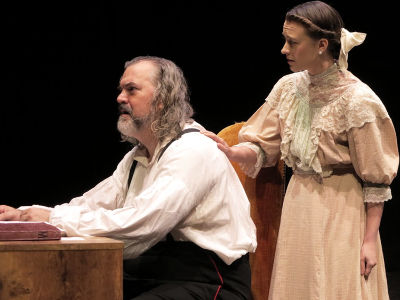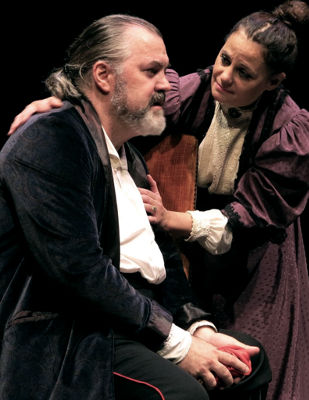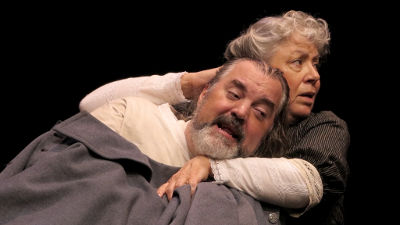
Beate
Hein Bennett
Ohh,
the Uncertainty… August
25 – September 2
One big uncertainty has bedeviled male consciousness since time immemorial: How do I really know if I am the actual father of my child? This question has loomed over marriage and parenthood where the suspicion of female betrayal has corroded the man’s trust in the relationship. While DNA testing has made it possible in our time to ascertain the biological origin of a child, this tool of genetic truth finding was not available in Strindberg’s time. August Strindberg’s plays are famous for their dissection of marital and paternal pathologies. The female characters are often portrayed in this dissection as scheming harridans—his own marital experiences (maybe due to his own psyche) certainly informed his dramaturgy. In plays, such as “Dance of Death,” or “Ghosts,” the wives are shown to gradually drive the men insane by their infantilizing, emasculating, and surreptitiously undermining actions while the husbands grow more and more paranoid and erratic in their attempts to maintain authority over themselves and their household. The present Strindberg Rep production of “The Father” in a new translation and directed by Robert Greer with editing by the actors Natalie Menna and Brad Fryman who play respectively the roles of the wife Laura and her husband, The Captain (the Father) exhibits the full range of Strindbergian angst with its deadly consequence. However, as translator/director Robert Greer points out, in his work there is no glossing over the innuendoes of sexual frustration on the part of the much younger wife Laura, aged 36, and her husband’s implied impotence at age 54, possibly due to another 19th century curse, syphilis. (The Captain comments quietly at some point about an early love affair having given him nothing but chancre sores.)
The play starts out with a playful discussion about the uncertainty of fatherhood between The Captain and his brother-in-law, the Pastor. The subject of the discussion is Happy, the Captain’s Orderly, appropriately played in lighthearted fashion by Tyler Brown; Happy is accused of having impregnated a young girl. The three men agree that he may or may not be the father; after all, “one can never know.” The Pastor, played with tightlipped facetiousness by Toby Miller, proclaims that “too many women rule your roost” whereby he includes himself as another henpecked rooster. A brief intimation of troubles to come!
The women in the Captain’s household include Laura, who runs the household with a strong will; their daughter Bertha, age 15, a lively and lovable young woman whose future education is to be decided—a major source of disagreement between father and mother; and the Captain’s childhood nursemaid Margaret, a kind soul, aged 72. Natalie Menna plays Laura with the emotional complexity of a woman who is in her sexual prime but confined by social propriety and repressed in an unfulfilled marriage, as becomes obvious in her attraction to Doctor Östermark, portrayed by Daniel Lugo with proper restraint as behooves a medical professional. Bailey Newman imbues Bertha with lovely innocence mixed with self-assurance until she is shocked by her father’s sudden aggression fueled by doubts about his fatherhood. Jo Vetter’s Nurse Margaret has the difficult task to calm the Captain’s inner turmoil while also ultimately betraying him as she was tasked with putting him into the strait jacket for commitment to the insane asylum. The Captain is a study in self-destruction. Mr. Fryman plays the full register from being a generous family father whose primary interest is in providing his daughter with an education that gives her the possibility of an independent future; he wants her to study to become a teacher. As he tries to impose his will, he is undermined by his wife who plants doubts about his sanity in The Captain himself and in those around him. Mr. Fryman portrays his gradual mental demise through insidious doubt about his fatherhood with subtlety and a well-paced change from being the master of the household to becoming an infantilized wreck—the last image of him is straitjacketed and curled up on the lap of his nursemaid Margaret.
Robert Greer moves the ensemble through the disintegration of a family and the psychic unraveling of all the members with clarity. He establishes a delicate balance in the relationship between husband and wife by which the tragedy of a bad marriage does not become the full fault of one or the other but rather the issue of mutual trust about the most intimate aspect of a marital relationship which is parenthood. The open stage space provides room for variety in movement allowing for physical distance and intensification of proximity where necessary. While Strindberg’s play is relentless in its descent into madness, the production manages to maintain a dynamic that engages the audience throughout the performance without the interruption of an intermission. |
| recordings | coupons | publications | classified |



